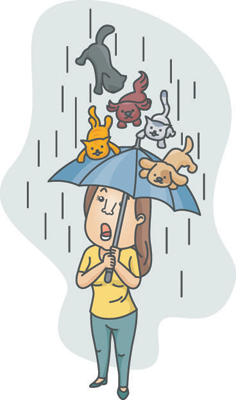Litdektekte: "rainy" idioms in English
 Of all the English idioms, it is “rainy” that seem to the Russian person to be completely nonsense: it is hard to understand at first glance why animals with different degrees of exoticism and life-threatening objects fall from the sky during a shower. It's rains cats and dogs, it rains pitchforks and stair-rods - the origin of these phrases is vague, like Albion himself. And each, like a decent English joke, has its own zest.
Of all the English idioms, it is “rainy” that seem to the Russian person to be completely nonsense: it is hard to understand at first glance why animals with different degrees of exoticism and life-threatening objects fall from the sky during a shower. It's rains cats and dogs, it rains pitchforks and stair-rods - the origin of these phrases is vague, like Albion himself. And each, like a decent English joke, has its own zest.Let's start with the worst case - with «cats and dogs». British
')
The verbal pirouette belongs to Mr. Jonathan Swift - the very Swift who invented Gulliver and the word “Yahoo” (yeh). In the book The Complete Collection of Noble and Witty Conversations, he wrote:
" I wouldn’t be happy, but I’m not sure if I’m going to be a cat ."
And thus he beautifully referred to his other work of nearly thirty years ago. The poetic sketch “Description of the rain in the city” perfectly reflected the modernity of Swift in 1710 and in 1738: strong streams of water washed dead cats and puppies out of the gutters and carried them through the streets. What can you say? An unsightly sight is an excellent target for a caustic satirist!
A little earlier, another satirist, Richard Brom, in the comedy “The City Mystery, or the Woman in the Breeches” (1652), said that it was not cats, but ferrets:
“It shall be rain dogs and polecats. "
Polecat - ferret black forest; In Britain, he prospered everywhere until the end of the XIX century. Unlike cats, ferrets are able to swim, so it’s more likely that the sounds of heavy rain resemble a gnawing between a wild ferret and a dog.
And then - more interesting. In the poetry collection “The Swan from the River Ask” (1651) we are talking about the “soul” of cats and dogs. And it would be okay if there were just a lot of unfortunate animals, figuratively speaking. But no - the poet Henry Vaughn (by the way, a Welshman, not a Korean) claims that “the roof will reliably protect the goods of the peddlers” from such a disaster:
“… From dogs and cats rained in shower.”
And it already pulls on the natural cataclysm, which is unusual for us, but quite familiar to them.
As an island nation, Britain has seen quite a few storms and storms, although the written evidence of eyewitnesses from the 15th to the 18th century has been preserved in part or not at all. But there is plenty of information about the most formidable hurricane in the history of the country, the Great Storm of 1703 - thanks to the enterprising
As for Defoe himself, he was fabulously lucky both as a person and as a writer. Just a couple of days before the hurricane, he got out of prison (recruited by conservatives and all in debt), and immediately after the elements raged, interviewed numerous eyewitnesses - know-how in journalism of that era - and wrote the novel "Storm". His contemporary Swift was then in Dublin, where the hurricane did not get. If everything was different, who knows, what other expressions would have added to British English of the New Age, besides raining cats and dogs?
The Americans did not go away and made their contribution to the language. In the comedy of David Humphreys, this
" I'll be even with you, if it rains pitchforks-tines downwards. " [Pitchforks-tines - teeth on the forks.]
Then the phrase "simplified" to it's raining like pitchforks . When piercing streams of rain pierce an umbrella or a cloth of clothes - this is what it is))
The handles of hammers ( it rains hammer handles ) and chicken cells ( it rains chicken coops ) were also invented by Americans, but it is difficult to say who exactly and under what circumstances, for everything is fair: from echo imitation to a storm hurricane.
An interesting idiom belongs to the wit of Australians: it's a frog strangler (originally it's a frog-strangling downpour ). In fact, nobody stifles frogs, they just drown because there is a flood on the street!
Let's go back to Britain, there are metal rods left: it's raining stair-rods . These are the most brilliant decorative things with which they lay the front carpet paths on the marble staircases. The hurricane is nothing to do with, talking about a strong-strong shower in calm: long, smooth jets really resemble twigs (well, or touches, like in Chinese engravings).
“ It rains darning needles ” (literally “darn needles”) complain of “thorny” rain. And they say about a noisy, frantic shower: “ it's bucketing ” (originally “ it's raining buckets ” - pouring like a bucket) or “ it's raining wolves and tigers ” and even “ it's raining elephants and giraffes ” - the choice depends on the amount of water, power sound effects and personal desire to joke. Here we will write it's raining kittens and puppies - about weak, drizzling rain. The last three expressions, as you can see, are derivatives of cats and dogs .
Well, we figured out the idiomatic zest, the etymology wandered through the wilds of the
"Gosh, it's raining cats and dogs," said Fred looking out of the kitchen window.
"I know," said his mother. “I've just stepped in a poodle!”
(Poodle ['pu: dl] - poodle, puddle [' pʌdl] - puddle. Who wants to translate - dare!)
And close the "rainy" topic)
Source: https://habr.com/ru/post/154555/
All Articles